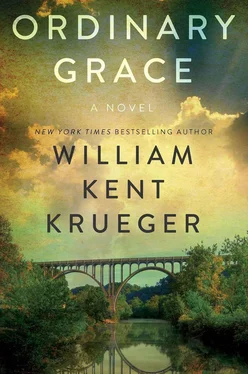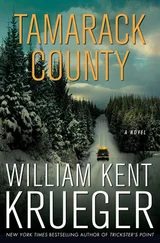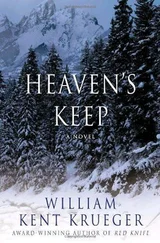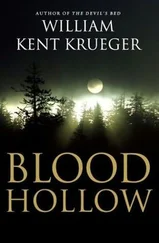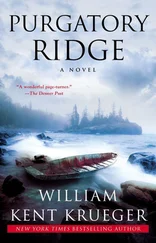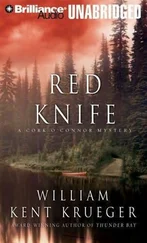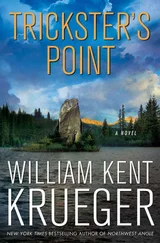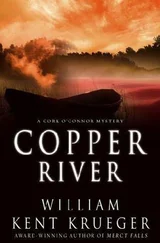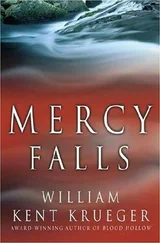William Krueger - Ordinary Grace
Здесь есть возможность читать онлайн «William Krueger - Ordinary Grace» весь текст электронной книги совершенно бесплатно (целиком полную версию без сокращений). В некоторых случаях можно слушать аудио, скачать через торрент в формате fb2 и присутствует краткое содержание. Жанр: Триллер, на английском языке. Описание произведения, (предисловие) а так же отзывы посетителей доступны на портале библиотеки ЛибКат.
- Название:Ordinary Grace
- Автор:
- Жанр:
- Год:неизвестен
- ISBN:нет данных
- Рейтинг книги:4 / 5. Голосов: 1
-
Избранное:Добавить в избранное
- Отзывы:
-
Ваша оценка:
- 80
- 1
- 2
- 3
- 4
- 5
Ordinary Grace: краткое содержание, описание и аннотация
Предлагаем к чтению аннотацию, описание, краткое содержание или предисловие (зависит от того, что написал сам автор книги «Ordinary Grace»). Если вы не нашли необходимую информацию о книге — напишите в комментариях, мы постараемся отыскать её.
Ordinary Grace — читать онлайн бесплатно полную книгу (весь текст) целиком
Ниже представлен текст книги, разбитый по страницам. Система сохранения места последней прочитанной страницы, позволяет с удобством читать онлайн бесплатно книгу «Ordinary Grace», без необходимости каждый раз заново искать на чём Вы остановились. Поставьте закладку, и сможете в любой момент перейти на страницу, на которой закончили чтение.
Интервал:
Закладка:
“He looks like he’s sleeping,” I said.
“This here was a good death.”
“Good?”
“I was in the war,” the Indian said. “The First World War. The war to end all wars.” He looked at the bottle and drank. “I saw men dead in ways no man should die.”
I said, “How did he die?”
The Indian shrugged. “Just died. Was sitting there talking one minute. The next he was lying there like that. Fell over. Heart attack maybe. Maybe a stroke. Who knows? Dead’s dead that’s all she wrote.” He drank some more.
“What’s his name?”
“Name? I don’t really know. Know what he called himself. Skipper. Like he was a sea captain or something. Hell, maybe he was. Who knows?”
“Was he your friend?”
“About as much friend as I got, I suppose.”
“He doesn’t look old enough to die.”
The Indian laughed. “It’s not like voting or a driver’s license, boy.”
He began again to go through the dead man’s pockets. From inside the coat he pulled a photograph much handled and faded. He looked at it a long time then turned it over and squinted. “There’s writing on the back,” he said. “Lost my glasses a while back. Can you read it?”
“Sure,” I said.
He held it out toward me across the dead man’s body. I took it and looked at it and Jake who was next to me leaned over to look too. It was black and white and was of a woman with a baby in her arms. She wore a plain dress that appeared gray in the photo with a pattern of white daisies. She was pretty and was smiling and behind her was a barn. I turned the photograph over and read out loud the writing on the backside.
October 23, 1944. Johnny’s first birthday. We miss you and hope you can be home for Christmas. Mary.
I handed the photograph back. The Indian’s hand shook a little and I saw that his palms were dirty and his nails ragged. He said, “Probably called to service in the second war to end all wars. Hell, maybe he really was a sea captain.” The Indian drank some more and leaned his head back against the embankment and looked up at the trestle and said, “Know what I like about railroad tracks? They’re always there but they’re always moving.”
“Like a river,” Jake said.
I was surprised that he spoke and that he spoke without a stutter which was a thing he seldom did around strangers. The Indian looked at my brother and nodded as if Jake had spoken some great wisdom. “Like a steel river,” he said. “That’s smart, son, real smart.”
Jake looked down, embarrassed by the compliment. The Indian reached across the dead man and across me and put his hand with its dirty palm and ragged nails on Jake’s leg. I was startled by the familiarity of the gesture and I looked at the stranger’s hand on my brother’s leg and the realization of the danger inherent in the situation descended on me like a flame and I leaped up dislodging the offending hand and grabbed my brother and yanked him to his feet and dragged him up the slope of the riverbank to the tracks.
Behind us the Indian called out, “Didn’t mean anything, boys. Nothing at all.”
But I was running then and pulling Jake with me and I was thinking about that Indian’s hand and seeing it in my mind like a spider crawling Jake’s leg. As fast as I could force us we returned to Halderson’s Drugstore. The men were still in the back room drinking beer from brown bottles. When we stumbled in and stood before them breathless they ceased talking.
Gus frowned at me and said, “What is it, Frank?”
“We were down on the tracks,” I said between gasps for air.
Doyle gave a grin stupid and satisfied. “His old man don’t let them play on the tracks,” he said.
Gus ignored him and said evenly, “What about the tracks, Frank?”
I spoke with an urgency that had been building all the way from the trestle and that had been fed by my rumination on the Indian’s hand too familiar on Jake’s leg and by my own guilt at the danger in which I’d placed my brother. I said, “A stranger was there. A man.”
The faces of all three men changed and changed in the same frightening way. The stupid satisfaction left Doyle. Gus’s dogged patience fled. Halderson abandoned his mild demeanor and his eyes became like chambered bullets. All three men stared at us and in their faces I could see my own fear reflected and magnified. Magnified to a degree I had not anticipated. Magnified perhaps by all the sick possibility that grown men knew that I did not. Magnified probably by the alcohol they’d consumed. Magnified certainly by the responsibility they felt as men to protect the children of their community.
“A man?” Doyle stood up and took hold of my arm and forced me to come close to him where the smell of beer poured from his mouth, a stream on which his words were carried. He said, “What kind of man? Did he threaten you boys?”
I didn’t reply.
Doyle squeezed my arm so that it hurt. “Tell me, son. What kind of man?”
I looked to Gus hoping that he could see the pain on my face. But he seemed lost in the confusion of that moment which probably came not only from the confounding influence of the alcohol but also from the betrayal of the trust he’d put in me. He said, “Tell him, Frankie. Tell him about the man.”
Still I did not speak.
Doyle shook me. Shook me like a rag doll. “Tell me,” he said.
Halderson said, “Tell him, son.”
“Tell him, Frank,” Gus said.
Doyle shouted now. “Tell me goddamn it. What kind of man?”
I stared at them, dumbed by their viciousness, and I knew I would not speak.
It was Jake who saved me. He said, “A dead man.”
4
On a minister’s salary we ate cautiously but we ate well. That didn’t mean the food was good; my mother was a notoriously bad cook. But she was a savvy shopper and made sure there was plenty to sustain us. Most Saturday nights my father made hamburgers and milk shakes and we ate these with potato chips. Salad was the lettuce and tomato and onion we put on our burgers though sometimes my mother would cut carrots and celery into sticks. We looked forward to dinner on Saturdays which we sometimes ate around a picnic table in our backyard.
That Saturday things were different and they were different because of the dead man and because Jake and I had reported him. My father had come to pick us up at the police station where we waited with Gus. We’d answered the questions of the county sheriff who was a man named Gregor and who’d been called into town from the small farm he operated on Willow Creek. He didn’t look like a sheriff. He was dressed in overalls and his hair was stiff with hay dust. He treated us kindly though he was stern when it came to his admonition that the railroad tracks were no place for boys to play. He reminded us about the unfortunate Bobby Cole. He sounded truly sad when he spoke of Bobby’s death and I had the sense that it meant something to him and I was inclined to like him.
Jake stuttered horribly when he was questioned and in the end I told the story for both of us. I didn’t mention the Indian. I don’t know why. The sheriff and the men in the police station hadn’t been drinking and they seemed reasonable and I wasn’t afraid that they’d do violence if they picked him up. But Jake in his utterance in the back room of the drugstore had omitted the Indian and in doing so had lied and the lie once spoken had taken shape as surely as if he’d chiseled it from a block of limestone. To undo it would be to put on my brother’s shoulders the impossible responsibility of trying to explain why he’d dissembled in the first place. Since the moment when with astonishing clarity he’d spoken the lie, Jake hadn’t been able to say a single word without stumbling through a long preamble of unintelligible utterances that were an embarrassment to him and to all who were present.
Читать дальшеИнтервал:
Закладка:
Похожие книги на «Ordinary Grace»
Представляем Вашему вниманию похожие книги на «Ordinary Grace» списком для выбора. Мы отобрали схожую по названию и смыслу литературу в надежде предоставить читателям больше вариантов отыскать новые, интересные, ещё непрочитанные произведения.
Обсуждение, отзывы о книге «Ordinary Grace» и просто собственные мнения читателей. Оставьте ваши комментарии, напишите, что Вы думаете о произведении, его смысле или главных героях. Укажите что конкретно понравилось, а что нет, и почему Вы так считаете.
